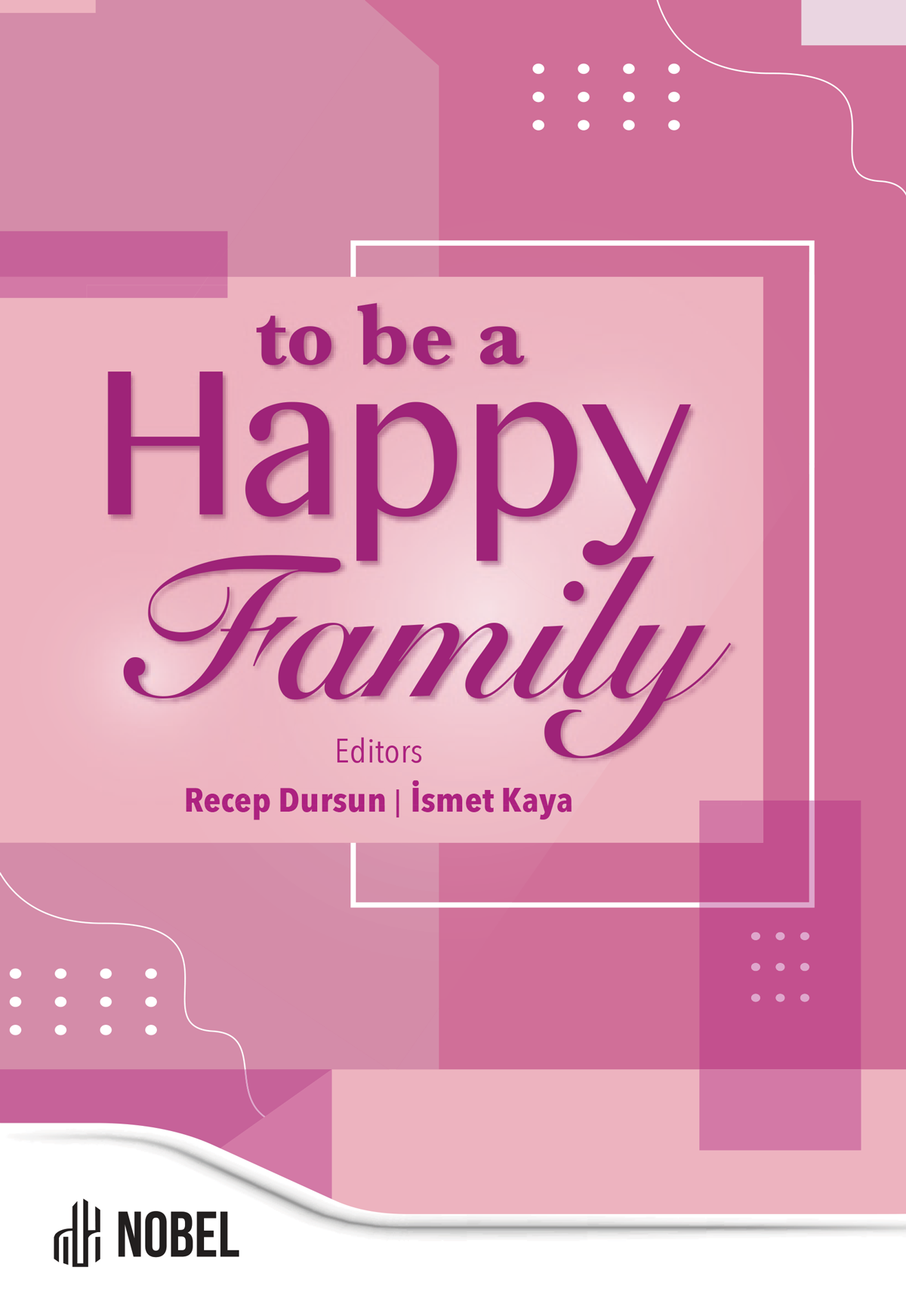To Be Me in Family
Bedrettin Isik (Author)
Release Date:
This text explains the importance of the concept of "Being Me" in the family and what needs to be done about it. "Being me" is possible when the individual knows himself, is spiritually strong, determines his priorities, knows and fulfills his limits and responsibilities, and is also aware of the psychological wounds he has experienced [...]
Media Type
Buy from
Price may vary by retailers
| Work Type | Book Chapter |
|---|---|
| Published in | To Be a Happy Family |
| First Page | 121 |
| Last Page | 140 |
| DOI | https://doi.org/10.69860/nobel.9786053359500.7 |
| Page Count | 20 |
| Copyright Holder | Nobel Tıp Kitabevleri |
| License | https://nobelpub.com/publish-with-us/copyright-and-licensing |
Bedrettin Isik (Author)
MD, Family Doctor, Provincial Health Directorat
https://orcid.org/0009-0000-7944-527X
3Bedrettin IŞIK, graduated from Ondokuz Mayıs University Faculty of Medicine in 2008. He worked as a Family Physician in Diyarbakır and Mardin provinces for 16 years. He currently works as a Family Physician in Diyarbakır. He completed his Hypnotherapy Specialization training within the Ministry of Health of the Republic of Turkey and has performed individual and group hypnotherapy for many years. He gives parent and student seminars to families and educational institutions within the Family School he founded. He is married and has three children.
Fordham, F. (2015). Jung Psikolojisinin Ana Hatları. Translated by. Aslan Yalçıner. İstanbul: Say Yayınları. S.101-108, 101.
Daş, C. (2023). Bütünleşmek ve Büyümek: Gestalt Terapi Yaklaşımı. Ankara, Altınordu Yayınları. S.12, 47.
Köroğlu, E. (2022). Pozitif Psikoloji: Mutluluk ve Esenlik. Destek Yayınları. S.42-45, 202, 203.
Tarhan, N. (2013). Evlilik Psikolojisi: Öncesi ve Sonrasıyla Evlilik. Timaş Yayınları. S.30.
Tarhan, N. (2014). Bilinçli Aile Olmak. İstanbul: Timaş Yayınları. S.122, 119.
Peck, M. S. (2018). Az Seçilen Yol: Sevginin, Geleneksel Değerlerin ve Ruhsal Tekamülün Psikolojisine Yeni Bir Bakış. Translated by. Semra Ayanbaşı, Ankaşa Yayınları. S.286, 39, 172.
Alladin, A. (2015). Duygusal Bozuklukların Tedavisinde Kanıta Dayalı Bilişsel Hipnoterapi. Çev. Tahir Özakkaş. Psikoterapi Enstitüsü Eğitim Yayınları. S.198-201.
Goleman, D. (1998). Duygusal Zeka. Translated by. Banu S. Yüksel, İstanbul: Varlık Yayınları
Kruse, Jakob Adrian; Ciechanowski, Leon; Dupuis, Ambre; Vazquez, Ignacio; Gloor, Peter A. Sensors;Basel (Leveraging the Sensitivity of Plants with Deep Learning to Recognize Human Emotions) https://www.proquest.com/docview/3003423582/7FF66FED28644EF5PQ/1?sourcetype=Scholarly%20Journals
Takada. A. & Dan-Glauser. E. (2024). Scientific Reports (Nature Publisher Group); London (Decoding the complexities of emotion socialization: cultures, individual features and shared information)https://www.proquest.com/docview/2925319186/7314AF1E30CF4C2BPQ/11?sourcetype=Scholarly%20Journals
Watkins, J. G. & Watkins,H.H, Uygun, Z. M., & Hayrunnisa Sayı. (2021). Ego durumları: Teori ve Terapi. Litera Yayıncılık. S.140, 166.
Lipton, B. H. (2018). İnancın Biyolojisi, Translated by. Burcu Ünlütabak. İstanbul: Kuraldışı Yayıncılık. S.26.
Cloud, D. H., & Townsend, D. J. (2007). Sınırlar, Translated by. İdil Güpgüpoğlu, İstanbul, Sistem Yayıncılık. S.18, 36, 23, 23, 25, 27, 154.
Peterson, R. & Tech, V. (2009). FAMILIES FIRST Produced by Communications and Marketing, College of Agriculture and Life Sciences, Virginia Polytechnic Institute and State University. https://vtechworks.lib.vt.edu/server/api/core/bitstreams/1ebedda0-1432-4eaf-b30bba7709a88b96/content
Hill, A. (2018) Dikkate Değer Olmak. Translated by. Hatice SAKA. Sola Unitas. S.81.
Haley, J. (2016) Çev. Uzbaş, A. Problem Çözme Terapisi. Pegem Akademi. S.142.
Mackenzıe, J. R. (2014). Çocuğunuza Sınır Koyma, Translated by. Mehtap Gün. Yakamoz Yayıncılık, İstanbul. S.15-29.
Zeig, J.K. (2005). Milton H. Erickson ile Hipnozla Terapi Semineri. Translated by. S.A.Yeniçeriş S.Köseoğlu. Beyaz Yayınları. S.231.
Satir, V. & Yeniçeri, S. (2018). İnsan Yaratmak: Aile Terapisinin Başyapıtı. Beyaz Yayınları. S.375, 49.
Gibson, L. C. (2020). Olgunlaşmamış Ebeveynlerin Yetişkin Çocukları. Translated by. Dilek Poyraz İstanbul: Sola Yayınları. S.137.
| onix_3.0::thoth | Thoth ONIX 3.0 |
|---|---|
| onix_3.0::project_muse | Project MUSE ONIX 3.0 |
| onix_3.0::oapen | OAPEN ONIX 3.0 |
| onix_3.0::jstor | JSTOR ONIX 3.0 |
| onix_3.0::google_books | Google Books ONIX 3.0 |
| onix_3.0::overdrive | OverDrive ONIX 3.0 |
| onix_2.1::ebsco_host | EBSCO Host ONIX 2.1 |
| csv::thoth | Thoth CSV |
| json::thoth | Thoth JSON |
| kbart::oclc | OCLC KBART |
| bibtex::thoth | Thoth BibTeX |
| doideposit::crossref | CrossRef DOI deposit |
| onix_2.1::proquest_ebrary | ProQuest Ebrary ONIX 2.1 |
| marc21record::thoth | Thoth MARC 21 Record |
| marc21markup::thoth | Thoth MARC 21 Markup |
| marc21xml::thoth | Thoth MARC 21 XML |

